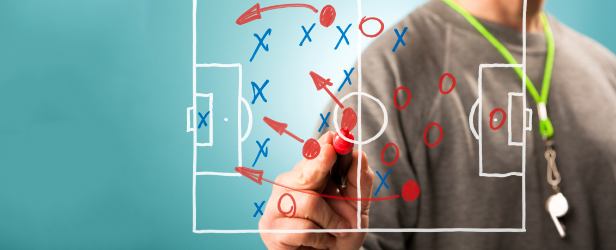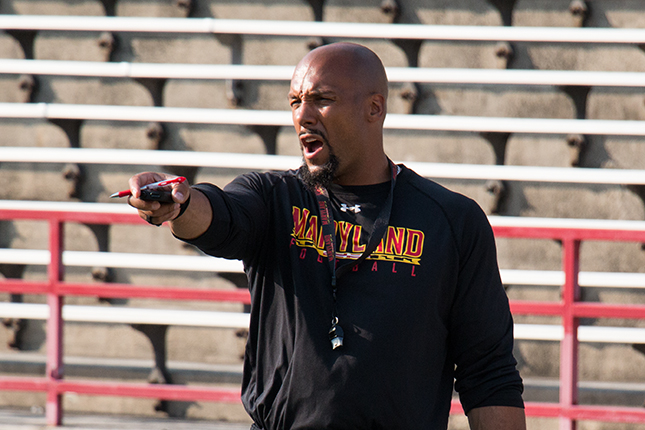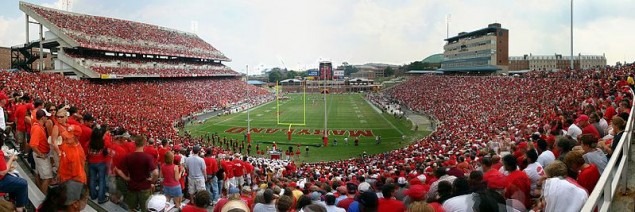
This month I felt that it was best to shut my mouth and listen instead of preach about things that make me look smart when really they're just different ways to look at what all of you know already.
I met Drew Wilson a few years ago when I drove down to visit the University of Maryland and see what they were doing to make the Terrapins stronger. I never told Coach Wilson this, but as soon as I returned to campus, I immediately implemented two of the things he told me. They have both become a staple of how we do things. I promise you that if you learn from others, you will be richer from the experience.
Now tuck your shirts in, tie your shoes and enjoy this talk with Coach Wilson.
TH: Coach Wilson, thank you for taking the time to do an interview with me and the readers of elitefts.com. Let me start out by asking, what made you want to be a strength and conditioning coach?
DW: Probably like the majority of strength coaches, I was introduced to this field through my own personal goals to get bigger, faster and stronger and overall be a better athlete. I always knew that I wanted to be a coach, but I didn’t know you could be a strength coach until my junior year in undergrad. After I graduated, I spent a year coaching football and knew immediately that I wanted to be a strength coach. From there, I went on to Springfield College and the rest of my career took shape from there.
Honestly, I just love to watch athletes perform in the athletic arena. It’s an awesome feeling to watch young men train for an entire off-season and then go out and watch them strive to achieve all their goals. I believe every coach has moments of satisfaction when he sees his athletes become successful on and off the field. I personally coach to change lives spiritually, mentally and physically. The medium I use to connect to young lives is weightlifting. We spend the majority of time with athletes on a daily basis. Who we are can have a tremendous impact on them as people. To some of these kids, we are father figures, older brothers and ears to listen to their problems. If you want a young mind to listen to your demanding voice when you're asking him to go harder in training, you had better get to know him individually. It’s my belief and it will never change.
TH: You have an interesting history being an athlete at a lower division school but only coaching at some of the top programs. Do you feel that your playing influences what you do every day?
DW: I don’t let my personal playing career dictate how I coach my guys. I just coach plain and simple. Yes, they do ask me about my experiences, but in the end, they want to know that I'm here to help them achieve their goals. We have a short window of 3–5 years to make a lasting lifelong impact on them. I don’t take that time for granted.

Photo via http://marylandpride.com
TH: Tell us about your staff and what you do to try to make them the best in the country.
DW: My staff will always be made up of aggressive thinkers who are nothing like me personality wise but who love to coach and learn on a daily basis. Having a great work ethic is something that I take pride in my staff having.
I currently have two full-time assistants and two interns on staff right now. Matt Barber is the assistant director of football strength and conditioning, and Justin Geyer is an assistant football strength and conditioning coach. They are two great assistants who bring their hardhat to work every day, and I appreciate them for who they are and what they bring to the program.
The two things we do to always progress our program is coach hard every day and continue to educate ourselves. Every set and rep is coached in our weight room and we don’t do it by using a lot of jargon. We have simple, effective coaching cues that our players understand and that allows them to be successful. Players want to be successful and it’s our job to help them get there.
As a staff, we read one book together a year and discuss it. It may or may not be strength and conditioning related. The only requirement for the book is that it will allow us to have a positive impact on what we do every day. The main question we ask when selecting a book is, “How will this impact our guys?” We constantly discuss ideas as a staff and it isn't just me blurting out what I believe in. It’s a collective roundtable discussion. As a staff, you must find a way to grow.
TH: I know you have a great job now at the University of Maryland, but be honest—how do you deal with the beltway traffic?
DW: Lucky for me, I have an alternative route to work. I’ve been on the beltway during high volume traffic and it can be a parking lot. Also, like most strength coaches, I’m heading into work when the majority of people are still horizontal in their beds.
TH: How much movement assessment testing do you do with your team?
DW: We do movement assessment testing with our high needs mobility players, athletes recovering from traumatic injuries and incoming freshmen and transfers. I do believe in establishing a baseline by doing selective testing, but I know that I can't completely alter a player’s genetic structure. Realistically, you can find an inefficient movement pattern in anyone. At the end of the day, an athlete is who he is. If a player can get in the proper starting position for an Olympic movement, squat to parallel and move correctly in change of direction drills, I'm seeing mobility at its finest. At the end of the day, I’m smart enough to know that I can improve some areas, but I’m not God.
TH: I know you attended Springfield College. Can you share with us the secret handshakes that you guys and gals give each other to get all the jobs? Seriously though, what do you think Springfield is doing differently that prepares each of you to excel?

Photo via shopcollegepark.org
DW: As a graduate assistant, Springfield College allowed me to be hands-on from day one with the athletes. I was the head coach for the sport(s) that I oversaw. By the time I left Springfield College, I already had experience in writing programs, scheduling teams and having evaluation meetings with coaches along with all the other duties that our jobs entail on a daily basis. That was the best thing about being at Springfield. The program allowed the young strength coach to grow from day one. My director (Dr. Margaret Jones) oversaw my programs, but she allowed me to construct everything from scratch. She was there as a guide, not to write the programs for me or meet with coaches.
We were also required to do two internships before we graduated. This gave us a chance to go out and see other programs and what they did. I believe it’s the hands-on training that makes the strength coach, not how many books he or she can recite word for word. We coach people. It’s a people business.
TH: Let's talk programming. What are your biggest dos and don'ts, and what makes your program successful?
DW: This is a great question that could be long-winded, but I'll give you the blueprint to what we do here at the University of Maryland. I believe in keeping my methods simple yet effective by blending a balanced combination of strength and speed development into the program, depending on the time of year. To quote Coach Buddy Morris, “Don’t mistake simple for easy.”
I train a power sport and need to develop players who can apply a large amount of force in a short amount of time. I believe in using movements that are multi-joint and ground-based in nature. Our program is Olympic-based and 90 percent of our movements are done using a barbell. I do include unilateral training for upper and lower body movements as well. If I don’t include something in our program, it isn't because I believe it’s wrong. It just isn't for my program. We do what is best for the development of our players as individuals and as a team.
The success that I've had with our strength and conditioning program relies heavily on the work ethic of our players. There isn't any debate there. My goal is to make sure that what we do in training is competitive all the time. Whether it's against ourselves or another teammate, my goal is to breed competition.
TH: With the athletes evolving each year, how do you relate to your new freshmen as they walk through the door?
DW: I relate to the freshmen by eventually getting to know them. Every day when they walk through the door, the upperclassmen let them know the ground rules and the level of expectation. I just coach them hard and have fun while doing it.
TH: Is there anything else you'd like to add?
DW: I would just like to thank you for allowing me to give everyone a glimpse of our football strength and conditioning program here at the University of Maryland.











2 Comments